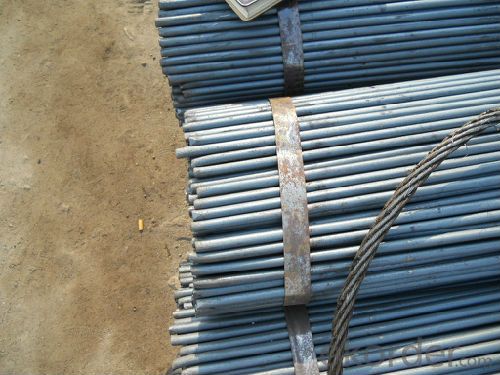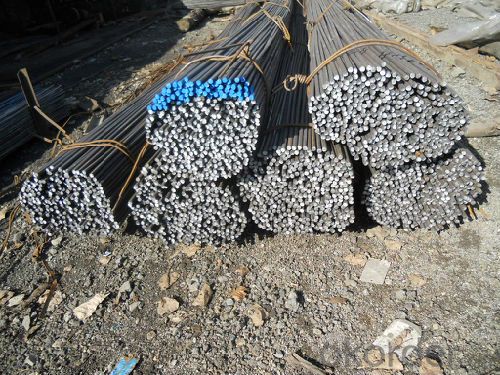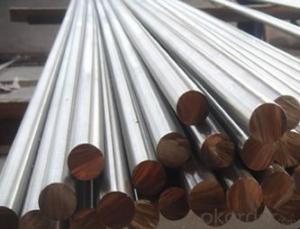High Quality Spring Steel Round Bar 40-50mm
- Loading Port:
- China main port
- Payment Terms:
- TT or LC
- Min Order Qty:
- 100 m.t
- Supply Capability:
- 10000 m.t/month
OKorder Service Pledge
OKorder Financial Service
You Might Also Like
High Quality Spring Steel Round Bar 40-50mm
Product Description:
Spring Steel can be divided into two types. One is carbon spring steel, and other one is alloy spring steel.
Alloy spring steel is based on carbon spring steel, by adding one or more alloying elements to improve the mechanical properties, hardenability and other properties to meet the requirement for manufacture all kinds of spring steel.
Specification of High Quality Spring Steel Round Bar 40-50mm:
-Material: 1065
-Standard: ASTM
-Production: Hot rolled or cold rolled
-Type: Spring Steel
| Diameter(mm) | Mass(kg/m) | Section(mm2) |
| 40 | 9.86 | 1256 |
| 45 | 12.5 | 1589.625 |
| 50 | 15.4 | 1962.5 |
Corresponding Steel Grade of High Quality Spring Steel Round Bar 40-50mm for Reference:
USA, ASTM | CHN, GB/T | JPN, JIS | ISO |
1065 | 65 | SWRH67A SWRH67B | Type SC Type DC |
FRA, NF | GBR, BS | ||
C66D | C66D |
Chemical Composition of High Quality Spring Steel Round Bar 40-50mm:
C | Mn | Ni | Si |
0.62~0.70 | 0.50~0.80 | ≤0.30 | 0.17~0.37 |
P | S | Cr | Cu |
≤0.035 | ≤0.035 | ≤0.25 | ≤0.25 |
Mechanical Properties of High Quality Spring Steel Round Bar 40-50mm:
-Tensile Strength σb (MPa): ≥695
-Yield Strength σs (MPa): ≥410
-Elongation δ10(%): ≥10
-Percentage reduction of area: ψ (%): ≥30
-Hardness HBS, no heat treatment: ≤255
Usage/Applications of High Quality Spring Steel Round Bar 40-50mm:
-ASTM1065, is medium-high carbon spring steel. After heat treatment, this type of steel obtains high strength, hardness and elasticity but this material isn’t perfect for welding.
-Its fatigue strength is equal to alloy spring steel when they are in same configuration.
-For manufacturing spring, spring circle, all kinds of grommet, clutch, and axels in the production of normal machine.
Packaging & Delivery of High Quality Spring Steel Round Bar 40-50mm:
-Packing Detail: The products can be packed in bundles by steel wires.
-Marks: There are two types of marks. One is color mark and other one is tag mark. We paint color marks on both ends of bundles to make sure that it’s more convenient for customers to distinguish their products from other products at the destination port. The tag marks will be tied up to each bundle to make sure that customers know the specifications of each bundle like product’s name and size and other information of products.
-Delivery Detail:
1, Delivery time: 30~60 working days after receive buyer’s T.T. or L/C.
2, Delivery status should be written in the contract. (Heat treatment or no)
FAQ:
Q1: Why buy Materials & Equipment from OKorder.com?
A1: All products offered byOKorder.com are carefully selected from China's most reliable manufacturing enterprises. Through its ISO certifications, OKorder.com adheres to the highest standards and a commitment to supply chain safety and customer satisfaction.
Q2: How do we guarantee the quality of our products?
A2: We have established an advanced quality management system which conducts strict quality tests at every step, from raw materials to the final product. At the same time, we provide extensive follow-up service assurances as required.
Q3: How soon can we receive the product after purchase?
A3: Within three days of placing an order, we will arrange production. The shipping date is dependent upon the quatity, how many sizes you want and the plan of production, but is typically 1 month to 2 month days from the beginning of production.
Images of High Quality Spring Steel Round Bar 40-50mm:


*If you would like to get our price, please inform us the size, standard/material and quantity. Thank you very much for your attention.
- Q:How does special steel perform in welding applications?
- Special steel performs well in welding applications due to its high strength, excellent heat resistance, and superior weldability. Its unique composition and alloying elements allow for precise control of the welding process, resulting in high-quality, durable welds. Additionally, special steel's ability to resist cracking and deformation during welding ensures reliable performance and structural integrity in various applications.
- Q:What is the impact of titanium in special steel alloys?
- Titanium is a highly versatile and valuable element when it comes to special steel alloys. Its addition to steel alloys has a significant impact on their properties and performance. One of the major impacts of titanium in special steel alloys is improved strength and durability. Titanium has a high strength-to-weight ratio, which means that even a small amount of titanium can greatly enhance the strength of the steel alloy. This is particularly beneficial in applications where high strength and resistance to deformation or fatigue are required, such as in aerospace or automotive industries. Moreover, titanium also contributes to the corrosion resistance of steel alloys. It forms a protective oxide layer on the surface of the steel, preventing or reducing the effects of corrosion caused by exposure to various environmental factors such as moisture, chemicals, or saltwater. This corrosion resistance is especially crucial in industries where steel is exposed to harsh conditions, such as marine or offshore applications. Another significant impact of titanium in special steel alloys is its ability to improve heat resistance. Titanium has a high melting point and excellent thermal stability, making steel alloys with titanium suitable for high-temperature applications. This is particularly important in industries like power generation, where steel components must withstand extreme temperatures without losing their structural integrity. Furthermore, titanium imparts excellent weldability to steel alloys. It acts as a deoxidizer, reducing the presence of impurities and improving the quality of welds. This is highly advantageous in manufacturing processes where welding is involved, as it ensures strong and reliable joints. In summary, the impact of titanium in special steel alloys is multifaceted and highly beneficial. It enhances the strength, durability, and corrosion resistance of steel, while also improving its heat resistance and weldability. These properties make titanium an invaluable element in the development of high-performance steel alloys for a wide range of industries.
- Q:How is corrosion-resistant stainless steel used in the production of marine equipment?
- Corrosion-resistant stainless steel is extensively used in the production of marine equipment due to its ability to withstand harsh marine environments. It is commonly used in the construction of ship hulls, propellers, valves, pumps, and other critical components. The stainless steel's resistance to corrosion helps prevent damage caused by saltwater, which can significantly extend the lifespan of the equipment and ensure its reliability and safety at sea.
- Q:What are the specific requirements for special steel used in the railway track industry?
- The safety, durability, and efficiency of railway tracks in the industry require special steel that meets specific requirements. Firstly, the steel used must possess high tensile strength to withstand the heavy loads and constant stress imposed by trains. This strength ensures the tracks maintain their shape and prevent deformation, allowing for smooth and stable train movement. Secondly, the steel must exhibit exceptional wear resistance due to the significant friction and wear between train wheels and tracks. It should withstand this wear and tear, minimizing the need for frequent maintenance and replacement. Thirdly, the steel must possess good fatigue resistance as trains exert repetitive loads on the tracks. Without adequate fatigue resistance, the steel may fail under cyclic loading, posing a risk of accidents. Fatigue resistance ensures the tracks remain intact and safe for extended periods. Furthermore, the steel must have high corrosion resistance to withstand exposure to various environmental and weather conditions. Moisture, temperature variations, and corrosive elements can cause rust and corrosion, making it vital for the steel to resist these effects. Additionally, the steel used in the railway track industry must meet specific dimensional and geometric requirements. This includes precise dimensions, straightness, and alignment to ensure proper installation and alignment of the tracks, enabling smooth and safe train operations. Overall, meeting the specific requirements for special steel in the railway track industry is crucial for ensuring safety, longevity, and efficiency. It allows for smooth and reliable train transportation, contributing to the overall success of the railway industry.
- Q:What are the main characteristics of heat-resistant steel forgings?
- Heat-resistant steel forgings have several main characteristics. Firstly, they possess superior thermal stability, enabling them to maintain their strength and mechanical properties even at high temperatures. This is crucial in applications where the forgings are subjected to intense heat and thermal cycling, such as in jet engines or industrial furnaces. Secondly, they exhibit excellent oxidation and corrosion resistance, ensuring longevity and reliability in harsh environments. Additionally, heat-resistant steel forgings typically have high creep resistance, allowing them to withstand prolonged exposure to elevated temperatures without deformation. They are also known for their exceptional toughness and resistance to thermal fatigue, making them highly durable under extreme conditions. Overall, these characteristics make heat-resistant steel forgings essential components in industries requiring materials capable of withstanding demanding thermal conditions.
- Q:What are the different methods of machining special steel?
- There are several different methods of machining special steel, each with its own advantages and applications. Some of the most common methods include: 1. Turning: Turning is a machining process that involves rotating a workpiece while a cutting tool removes material from the surface. This method is typically used to create cylindrical shapes and can produce high-quality finishes. 2. Milling: Milling is a versatile machining method that uses rotary cutters to remove material from a workpiece. It can be used to create complex shapes and contours, and is often employed in the production of special steel components. 3. Drilling: Drilling is a machining process that involves creating holes in a workpiece using a rotating cutting tool. It can be used to create both through holes and blind holes in special steel, and is commonly used in various industries. 4. Grinding: Grinding is a precision machining method that uses an abrasive wheel to remove material from a workpiece's surface. It is often used to achieve tight tolerances and smooth finishes on special steel components. 5. Broaching: Broaching is a machining process that uses a sharp cutting tool with multiple teeth to remove material in a series of linear cuts. It is commonly used to create keyways, splines, and other intricate shapes in special steel. 6. Electrical Discharge Machining (EDM): EDM is a non-traditional machining method that uses electrical discharges to remove material from a workpiece. It is particularly useful for machining special steel with complex shapes or for creating small features. 7. Laser Cutting: Laser cutting utilizes a high-powered laser to cut through special steel with extreme precision. It is commonly used for intricate designs and can produce smooth edges without the need for subsequent processing. Each of these methods has its own advantages and limitations, and the choice of machining method depends on factors such as the desired outcome, the complexity of the part, and the properties of the special steel being machined.
- Q:How does cryogenic treatment affect the toughness of special steel?
- The toughness of special steel is greatly affected by cryogenic treatment, which involves subjecting the steel to extremely low temperatures for an extended period. This process has the ability to transform the microstructure of the steel, resulting in improved mechanical properties, including increased toughness. Throughout cryogenic treatment, the steel goes through a process known as martensitic transformation, in which the carbon atoms within the steel lattice rearrange themselves. This transformation leads to the development of additional carbides, which strengthen the steel and enhance its toughness. These carbides act as barriers, hindering crack propagation and improving the steel's resistance to fracture. Additionally, cryogenic treatment reduces the presence of retained austenite, which is a metastable phase in steel that can have detrimental effects on its mechanical properties. The transformation of retained austenite into martensite during cryogenic treatment further enhances the toughness of the steel. The increased toughness achieved through cryogenic treatment makes special steel suitable for various applications that require high strength and resistance to fracture. It improves the steel's ability to endure heavy loads, impacts, and harsh environments. Moreover, cryogenic treatment can enhance the wear resistance and dimensional stability of special steel. It is important to acknowledge that cryogenic treatment alone is not a complete solution for optimizing the toughness of special steel. Other factors, such as the initial composition and heat treatment of the steel, also play a vital role in determining its overall mechanical properties. Therefore, cryogenic treatment should be considered as a complementary process in order to optimize the toughness of special steel.
- Q:What are the properties of shock-resistant alloy steel?
- Shock-resistant alloy steel is a type of steel that possesses specific properties that make it highly resistant to shock and impact. These properties include high tensile strength, toughness, and hardness. It is also known for its ability to withstand sudden changes in temperature, making it suitable for applications in extreme environments. Additionally, shock-resistant alloy steel has excellent fatigue resistance, corrosion resistance, and wear resistance, making it ideal for use in industries such as aerospace, automotive, and defense.
- Q:How does special steel contribute to the aerospace fastener industry?
- The aerospace fastener industry relies heavily on special steel due to its ability to offer high strength, durability, and resistance to extreme conditions. These fasteners are essential for keeping different parts of an aircraft together, ensuring the aircraft's structural integrity and safety during flight. The utilization of special steel in their manufacturing allows them to meet the rigorous demands of the aerospace industry. Maintaining strength at high temperatures is one of the significant advantages of special steel in the aerospace fastener industry. Considering that aircraft engines operate at extremely high temperatures, the use of special steel fasteners ensures that they can withstand these conditions without compromising their integrity. This is crucial for maintaining the reliability and safety of the aircraft, as any failure of the fasteners could have catastrophic consequences. Apart from temperature resistance, special steel also possesses exceptional strength and corrosion resistance. Aerospace fasteners made from special steel can withstand the immense forces and stresses experienced during flight, ensuring that the components remain securely fastened together. Moreover, they exhibit high resistance to corrosion, which is of utmost importance considering the exposure of aircraft to harsh environmental conditions such as moisture and chemicals. The unique properties of special steel also make it possible to produce lightweight fasteners without sacrificing their strength. Weight reduction is a primary concern in the aerospace industry, as it directly affects fuel efficiency and overall performance. By utilizing special steel, manufacturers can design fasteners that are simultaneously strong and lightweight, contributing to the ongoing efforts of reducing weight in modern aircraft. Furthermore, special steel allows for the production of fasteners with precise dimensions and tight tolerances. This is crucial for achieving a secure fit between components, minimizing vibrations, and preventing potential damage caused by movement during flight. The accuracy and reliability of special steel fasteners play a vital role in maintaining the structural integrity and safety of the aircraft. In conclusion, special steel plays a significant role in the aerospace fastener industry by providing the necessary strength, durability, temperature resistance, and corrosion resistance required for aircraft applications. Its unique properties enable the production of lightweight yet robust fasteners, ensuring the structural integrity and safety of modern aircraft. Without the utilization of special steel, the aerospace industry would face substantial challenges in meeting the demanding requirements of aviation.
- Q:What are the properties of special steel?
- Special steel has several unique properties that make it highly desirable in various industries. Firstly, it possesses exceptional strength and durability, allowing it to withstand high levels of stress, pressure, and temperature. This property makes it suitable for applications in construction, automotive, and aerospace sectors where strength and reliability are crucial. Additionally, special steel offers excellent corrosion resistance, ensuring its longevity even in harsh environments. It is also known for its excellent machinability, weldability, and formability, making it easy to work with and shape into desired forms. Furthermore, special steel exhibits good magnetic properties, making it ideal for use in electrical components and magnetic devices. Overall, the properties of special steel make it a versatile material that can be customized for specific applications, offering exceptional performance and reliability.
1. Manufacturer Overview |
|
|---|---|
| Location | |
| Year Established | |
| Annual Output Value | |
| Main Markets | |
| Company Certifications | |
2. Manufacturer Certificates |
|
|---|---|
| a) Certification Name | |
| Range | |
| Reference | |
| Validity Period | |
3. Manufacturer Capability |
|
|---|---|
| a)Trade Capacity | |
| Nearest Port | |
| Export Percentage | |
| No.of Employees in Trade Department | |
| Language Spoken: | |
| b)Factory Information | |
| Factory Size: | |
| No. of Production Lines | |
| Contract Manufacturing | |
| Product Price Range | |
Send your message to us
High Quality Spring Steel Round Bar 40-50mm
- Loading Port:
- China main port
- Payment Terms:
- TT or LC
- Min Order Qty:
- 100 m.t
- Supply Capability:
- 10000 m.t/month
OKorder Service Pledge
OKorder Financial Service
Similar products
New products
Hot products
Related keywords






























